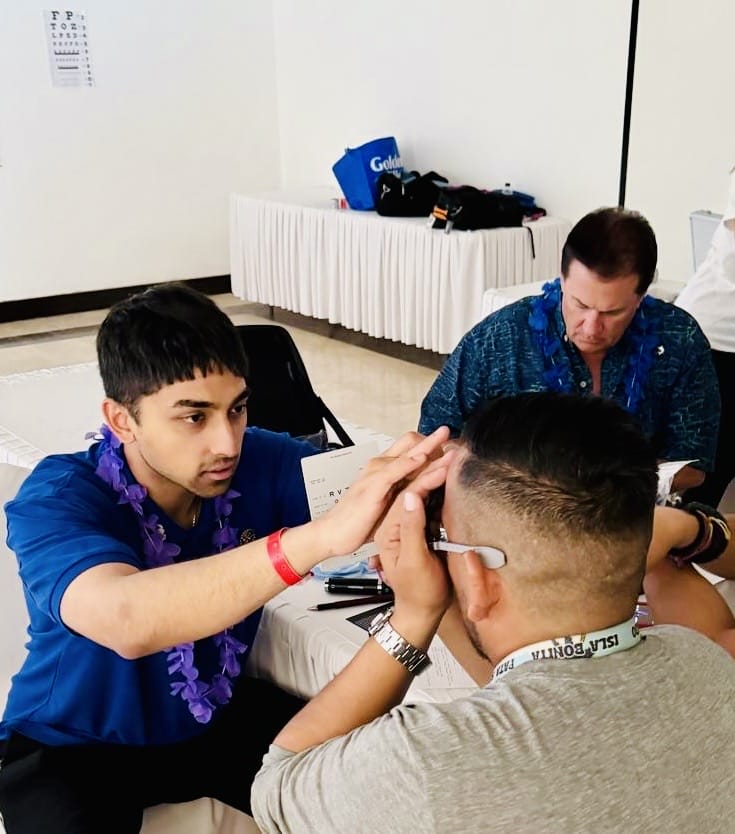WesternU College of Optometry professor publishes research on efficacy of nutritional supplements

Western University of Health Sciences College of Optometry Professor Pinakin Gunvant Davey, PhD, OD, FAAO, co-authored a recently-published study comparing the efficacy of nutritional supplementation that could potentially lead to new treatments for age-related macular degeneration.
“Efficacy of Commercially Available Nutritional Supplements: Analysis of Serum Uptake, Macular Pigment Optical Density and Visual Functional Response,” by Richard A Bone, Pinakin Gunvant Davey, Betzabe O Roman, and David W Evans was published in Nutrients. PMID: 32384663. DOI: 10.3390/nu12051321.
Participants of the study were given a 24-week supply of a lipid-based micronized liquid medical food, Lumega-Z™ (LM), containing 28 mg of the macular carotenoids lutein (L), zeaxanthin (Z) and meso-zeaxanthin (MZ), or given PreserVision™ AREDS 2 Formula (gel-caps; PV) containing 12 mg of the macular carotenoids L and Z, but no reported MZ. Serum levels of L, Z and MZ were obtained at baseline and after 12 weeks. Macular pigment optical densities (MPOD) and visual function were assessed at baseline and after 24 weeks.
From baseline to week 24, average MPOD in the LM-group increased by 0.064 from 0.418 to 0.482, whereas in the PV-group, it was essentially unchanged (0.461 to 0.459). Despite only a 2.3-fold higher carotenoid concentration than PV, LM supplementation provides approximately 3-4-fold higher absorption, which leads to a significant elevation of MPOD levels.
“Head-to-head comparisons are crucial in assessing commercially available nutritional therapies. These comparisons provide real-life data for clinicians, which is highly valuable for
patient care,” Davey said. “This is particularly important for nutritional supplements, unlike drug treatments, where there is limited published data concerning efficacy. We can only hope that more companies will evaluate, compare and publish their results on nutritional supplements that are commonly used by patients.”
Results from the study concluded that Guardion Health Sciences’ unique, proprietary medical food, Lumega-Z, provided significantly higher blood concentration levels of carotenoids, which have been shown by studies sponsored by the National Eye Institute to be important for slowing the progression of macular degeneration in certain patients, and the MPOD, which has been shown in studies to be an important and modifiable biomarker to track the progression of macular degeneration and other eye diseases, according to the Guardion website.
“We firmly believe Lumega-Z has the potential to address the significant unmet needs of age-related macular degeneration, a leading cause of vision loss, affecting a large population worldwide. The results demonstrated by Lumega-Z bolster our confidence in the potential to provide more effective and efficient eye health prophylactics and treatments, clearly representing an important breakthrough in the growing importance of MPOD and the increasing role of medical foods as an integral component of the physicians’ armamentarium of treatments for maintaining and restoring eye health,” commented Michael Favish, CEO of Guardion Health Sciences. “We are pleased to have another important study published in a tier one peer-reviewed journal.”
Click here to read the full story on Guardion Health Sciences’ website: https://guardionhealth.com/wp-content/uploads/2020/05/GHSI_Announces-Publication-of-LumegaZ-Manuscript-DRAFT-05082020.pdf



